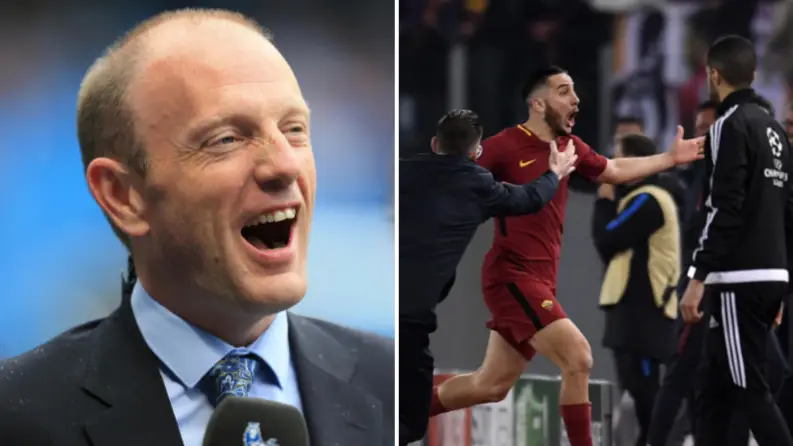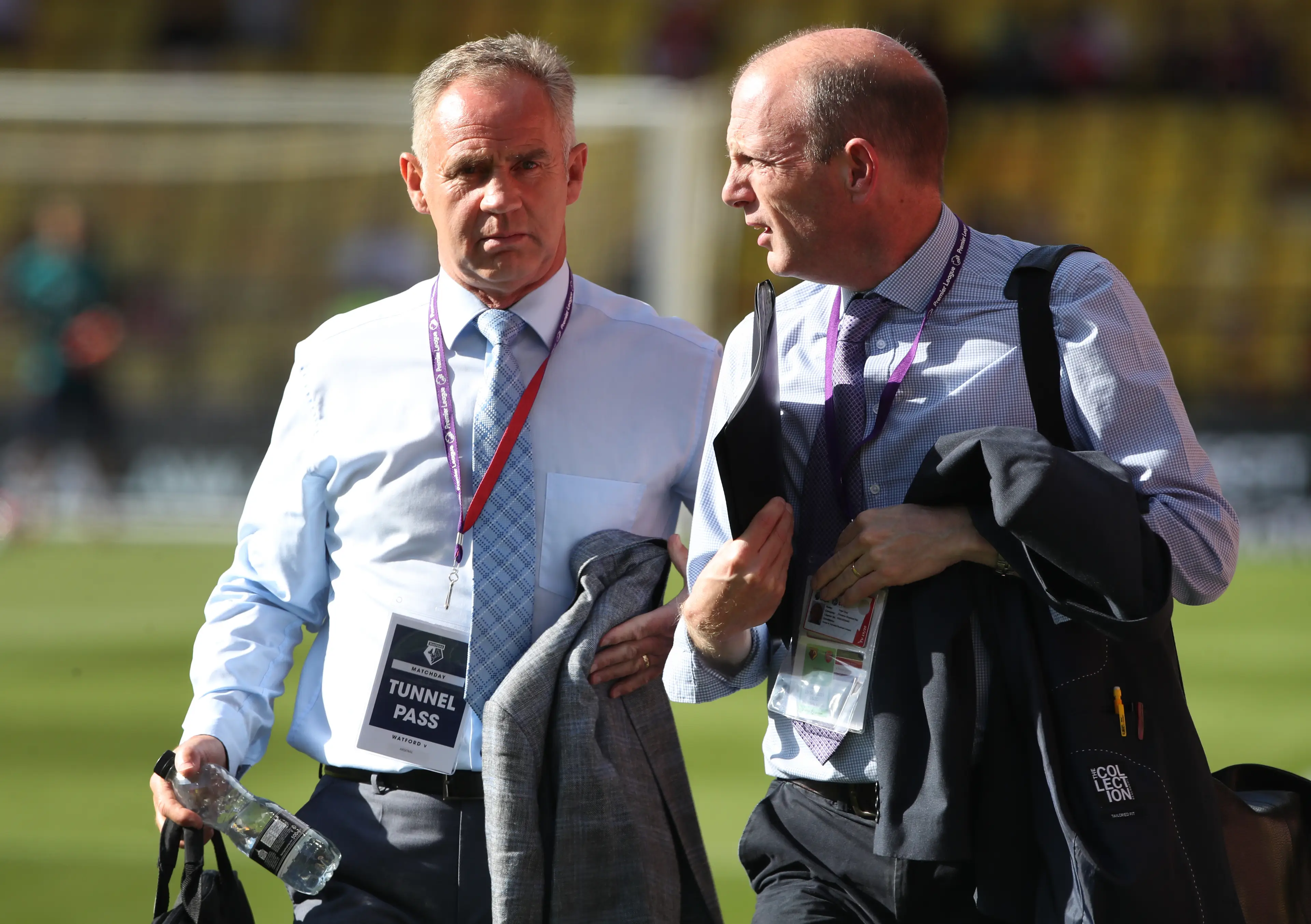
When Kostas Manolas headed home from a corner in the 82nd minute to score the all-important goal for Roma against Barcelona in a stunning Champions League quarter-final comeback at the Stadio Olimpico in April 2018, it spawned a wonderful monologue from Peter Drury.
"Roma have risen from their ruins... Manolas the Greek God in Rome. The unthinkable unfolds before our eyes...
"It is a Greek from Mount Olympus who has come to the seven hills of Rome and pulled off a miracle."
It was pure poetry; something you might have to analyse for your English literature exam. People have regularly asked if Drury prepared such a sonnet but it was all off the cuff, the moment providing all the inspiration the renowned commentator needed.
"The first time it occurred to me that I really might have to raise my game was when Roma got to within one goal and of course even then I didn't know Manolas was going to score it," Drury recalls in an interview with SPORTbible ahead of his stint in the commentary box for Amazon Prime Video's December Premier League coverage.
"Even when Manolas had scored it, I didn't know Manolas had scored it. Somebody at the near post got a flicked header so I had to come up with something until the director showed me who scored the goal.
"That night my planets kind of aligned. This weird series of words about Greek Gods came out. When I left the ground, I had no idea it had resonated. That night Liverpool were playing Manchester City - my game was not even the game for the English audience that night.
"Man City and Liverpool became a dead game, a few people turned over and this bizarre incident occurred. You're never quite sure where the story is going to happen."
Drury is well-known for his enthralling commentaries that have been broadcast to the nation for more than two decades, but he wasn't always destined to be holding a microphone, surveying the action on the green turf below.
When he left university, he had initially tried his hand at being an accountant but only lasted a month. Quickly discovering it wasn't for him, he packed it in to "follow the dream".
That dream has been realised. After working for sports agency Hayters and bagging a first job in local radio with the BBC in Leeds when the local club were champions in 1992, his dulcet tones serve as the soundtrack to some of the most memorable moments in football.
Drury's unique and poetic approach has become a huge hit. You only have to stumble across @QuotesDrury on Twitter to see the love his commentary gets.
He's been in the game for a long time now, working for the likes of ITV, BT Sport, Premier League productions, FIFA and now Amazon Prime Video, and yet there's never been an incline he might be going stale.
"I love football and I guess I love words. I love the language. I cover so many football matches that one of the dangers for me is becoming bored of myself and bored of saying the same things the same way over and over again.
"I do try to challenge myself to find different ways of articulating a football match. There are only so many and if you try too hard you get yourself into some silly situations.
"It's my job to articulate a football match. Every football match has its own narrative and context. I challenge myself to identify as best I can, in the sort of parameters I use, to bring that football match to life.
"I've never set out to have a style, that would be pretentious. The only thing I set out to be is authentic. What you hear is just me, like it or hate it."
Drury has never changed his approach but the introduction of VAR has proved challenging for him and all those who have the duty of capturing dramatic goals with their commentary.
"You didn't used to have that kind of scenario. From a commentator's view it can be a bit anti-climatic, you can get a goal and scream your head off and then say "Oops, no!" - which again didn't use to happen.
"But it's the way it is and we've all got used to it. To start with I think you thought you were going to appear a bit of a fool for screaming "GOAL!" and going bananas and then having to swallow your words but it's just become accepted practice now.
"It gives you a problem in the sense that you have to weigh up with how to deal with that jeopardy - whether to just sit in silence or whether to mutter on."

In recent times further difficulty has come from the fact that there was a lengthy period of behind-closed-doors football, meaning no atmosphere and no roar from 50,000 fans for Drury to ride off.
"When there's no noise, why would you shout? Ultimately, we had to acknowledge that if your team scored a goal - you were watching a game and I was commentating and I just went 'Oh Raheem Sterling has scored' - you'd be mildly disappointed by that.
"You've got to give it the works despite the fact that your voice could be ringing around the stadium. It does sometimes feel very unnatural. You sometimes wonder whether the players are hearing you as well, which is a bizarre thing.
"There is a weird dynamic and if we've learnt anything from the last nine months, surely it's that we need to respect the paying fan. Football fans are essential to the whole shebang."
After playing, reporting on football is the second-best job according to Drury. He gets to travel the globe, watch the best players and the biggest games from one of the bests seats in the house.
It's clearly not your regular 9-5 but living the dream doesn't mean escaping long hours and a gruelling schedule at times.
Relentless research is all part of his preparation. Drury has a file with about five or six pieces of A4 paper, with all the players from each side listed, the various stats, the current news around each of the players, each of the teams, their form and the history.
"One football match is essentially a day at the desk. If you think of a 9-5 day, that is, what I would invest, broadly speaking, in one football match.
"When we're in a crazy time, it means some very long hours actually. On average, it's eight hours to make one football match that is spent.
"Certainly if there's a Champions League game, if it's Shakhtar Donetsk or Brugge - one of the lesser known clubs - that requires a fair bit of time to watch old matches and make sure you know who the players are.
"Preparing for football matches is like GCSEs. Basically, you mug it up for a few crazy days beforehand, you spit it out on the exam paper for a couple of hours and by the next day you've forgotten it all again."
Drury has researched and commentated on a whole host of the greats. He loved doing AC Milan when Andriy Shevchenko and Kaka were in attack and he describes both Luis Figo and Zinedine Zidane as "beautiful" players who were "the artists of the game".
He was at the Santiago Bernabeu the night Lionel Messi wriggled through the Real Madrid backline, yet he has a love for commentating the 'proper' football with "workaday artisan players".
"I love the early rounds of the FA Cup, I love the Non-League teams where the postman scores the winner. I love all that sort of stuff. Real football. Football where you can get close to the people and really have a story to tell.
"When you're commentating on Liverpool vs Manchester United, there's not a lot you can tell the audience that they don't already know. You could easily argue you don't need a commentator at all!
"But if you're doing this coming FA Cup, Chorley vs Derby, there'll be stories to tell. There'll be somebody who works in the factory or a nurse, those are the best stories to tell.
"They're not the best footballers but sport for me is about humans in all their greatness and their frailty. That's what really ticks my boxes."
Drury feels privileged and lucky to have been "part of a travelling circus and that circus continues to entertain" - his brilliant summary of football and the works he does. And one he holds one game in particular in high esteem. South Africa vs Mexico, the opening game of the 2010 World Cup.
When the first goal was lashed in and vuvuzelas were blown, his gem of a line was as follows:
"TSHABALALAAAA!!!
"GOAL BAFANA BAFANA!
"GOAL FOR SOUTH AFRICA!
"GOAL FOR ALL AFRICA!""
To this day it makes the hairs on the back of your neck stand up and it's the same for Drury, the man who narrated that joyous moment.
"It was just a beautiful day for sport and humanity. It did something for the world that day that politics can never do. In that stadium in Johannesburg, the world was unified and equalised racially.
"Everyone was together. Arms were around shoulders, regardless of race, colour and creed. There was a universal smile around that game and then a boy called [Siphiwe] Tshabalala, who'd grown up in Soweto, scored a beautiful, beautiful goal.
"The symbolism of it hit me at the time and continues to hit me. Funnily enough, this summer during lockdown, was the tenth anniversary of that goal and I went on South African radio and they fixed me up with Tshabalala.
"It was a beautiful thing and honestly I welled up. That was the first game of a World Cup, South Africa didn't win it and nor did Mexico but I don't think there's been a more symbolic game in terms of what sport and football can do for the world than that game and that goal.
"I was lucky to have been there in a good seat to watch it."
Amazon Prime Video will be broadcasting 23 Premier League fixtures this December including two full rounds of fixtures on the 15th - 17th and 28th - 30th December, featuring matches such as Liverpool v Tottenham Hotspur, Wolverhampton Wanderers v Chelsea and Everton v Manchester City.
Topics: Football News, Football, Peter Dury, ITV, BT Sport